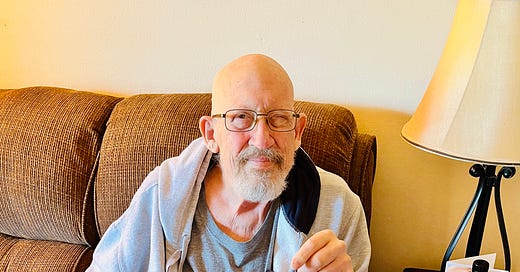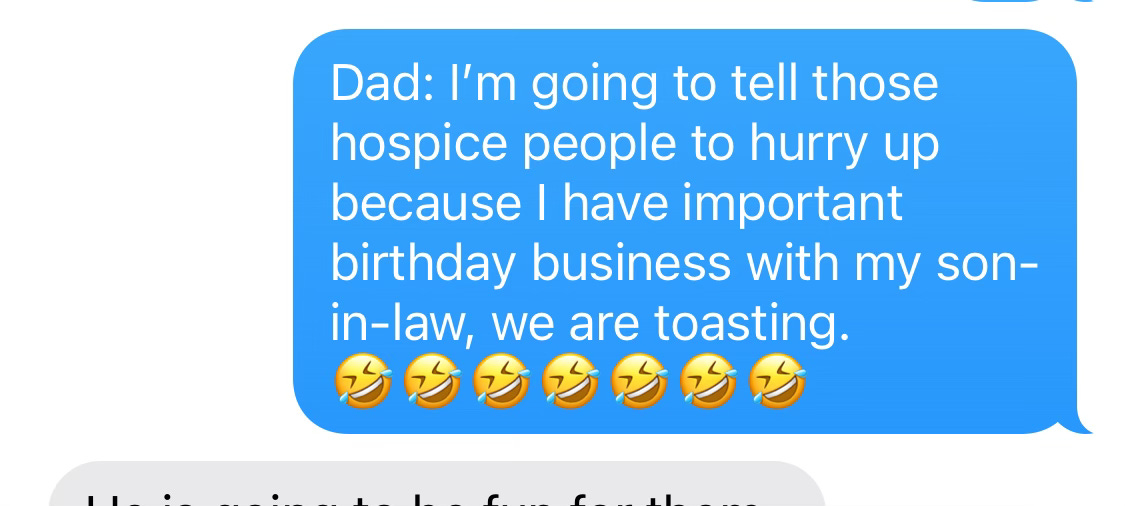For the past few days, grief has wrapped itself around me like a weighted blanket. At first, I thought it was just the approach of Dad’s birthday—that familiar ache that always finds me this time of year. But then it hit me. It wasn’t just the date on the calendar.
It was the memory.
Two years ago, this was the week I sat in his oncologist’s office, holding his hand as we decided to stop treatment. The decision to begin hospice. His first hospice visit landed on his birthday, but two days after his oncologist appointment, he thought he was dying that night.
We had just left their condo when Mom called, crying. “Dad says he doesn’t think he’ll make it through the night.”
I froze.
He’d been fine when I left.
Weak, yes.
But not actively dying.
And as a death doula, I knew the signs. I understood what it looked like when a body began to shut down. This wasn’t that.
But fear?
That was different.
Fear could trick the mind and shake the soul.
Phil, Logan, and I piled into the car and rushed back. Dad was sitting on the couch when we walked in. I looked at him and said, half-joking, “What the heck, you couldn’t make it to your birthday.”
He smiled weakly. “I know.”
But when I moved closer, I saw it—really saw it. He wasn’t actively dying. The anxiety in his eyes was raw. He had realized, maybe for the first time in complete clarity, that this was it.
No more treatments.
No more labs or chemo schedules.
Just time.
The end of nearly 68 years on this earth was drawing close, and he felt it.
“I don’t know how to do this,” Dad said, tears in his eyes.
I know he meant he didn't know how to die.
The body knows how, but I didn't say that; I just squeezed his hand.
I checked his vitals, sat beside him, and he let it all out.
I mean, it all came out.
The living room became sacred ground.
Dad cried, laughed, raged, whispered regrets, and shared memories.
He said things he needed to say.
We all did.
There wasn't a dry eye in that room.
We gave each other the gift of nothing left unsaid.
Eventually, he exhaled.
He softened.
We turned on the TV—Blue Bloods was starting, his favorite show.
He didn’t want to go to bed.
He didn’t want to be by himself.
And I promised him, just like I did in that oncologist's office, “I’ll be with you to the very end. I promise. You aren't alone.”
A couple of hours later, he was ready to go to sleep. We tucked him into bed. Took his glasses off and laid them on his nightstand. Phil and Logan said goodnight. I lingered, my hand on his knee.
“I’ll be here in the morning,” he said, flexing his arm with a tired grin. I bit back my emotions.
“I love you, Daddy.”
“I love you too, Daughter.”
And that’s why the grief feels heavier this week.
The body remembers.
The heart remembers.
He did make it to his birthday.
A day of hospice visits.
Dad said he just wanted to share a beer with his son-in-law.
And that's what we did—pizza, laughter, cold beer, and dark jokes.
Somehow, our humor found new levels of darkness and inappropriateness. I didn’t know that was possible, but it was.
The radiation and chemo had bought us a little time, but we knew in that oncology office—it was running out. His body just couldn’t take it anymore.
And still, I’m grateful.
Grateful I was in that room with him.
I am grateful I got to walk beside him, not just as his daughter but as someone who could hold space for both his fear and his strength.
No one should have to make that kind of decision alone.
And he didn’t.
He had us. He had me.
And I carry him still.
If you don’t know, sit down.
I always find it fascinating—and frankly frustrating—when people appoint themselves medical experts, especially when it comes to cancer, based solely on opinions rather than experience. The truth is, cancer doesn’t always show up in neat, early-detectable ways. Sometimes, it hides. Sometimes, it doesn’t make itself known until it’s already taken root in the late stages.
My dad is a perfect example.
He had his routine yearly checkup in May—nothing alarming. But by late July into early August, he began feeling unwell. He went to the ER, and that’s when we got the diagnosis: stage four cancer. Two weeks later, we were told he had 12 to 15 months to live. He passed away on July 7, 2023—eleven months from diagnosis to death.
Should my mom have known? Should I? Should he?
No.
None of us knew because there was no obvious reason to suspect it. That’s the brutal truth of some cancers—they don’t announce themselves until it’s far too late.
I also know others—friends, family—who were diagnosed at late stages. It happens more often than many people realize.
So, if someone can’t muster an ounce of empathy, then silence is the far better option than uninformed judgment.







I wish you were closer to help Uncle Joe and I through this journey no one wants.
Cancer is not predictable or all together preventable. We do our best and so many factors affect who and when folks get cancer. I thank you for sharing your journey of grief and loss with us. Much love ❤️